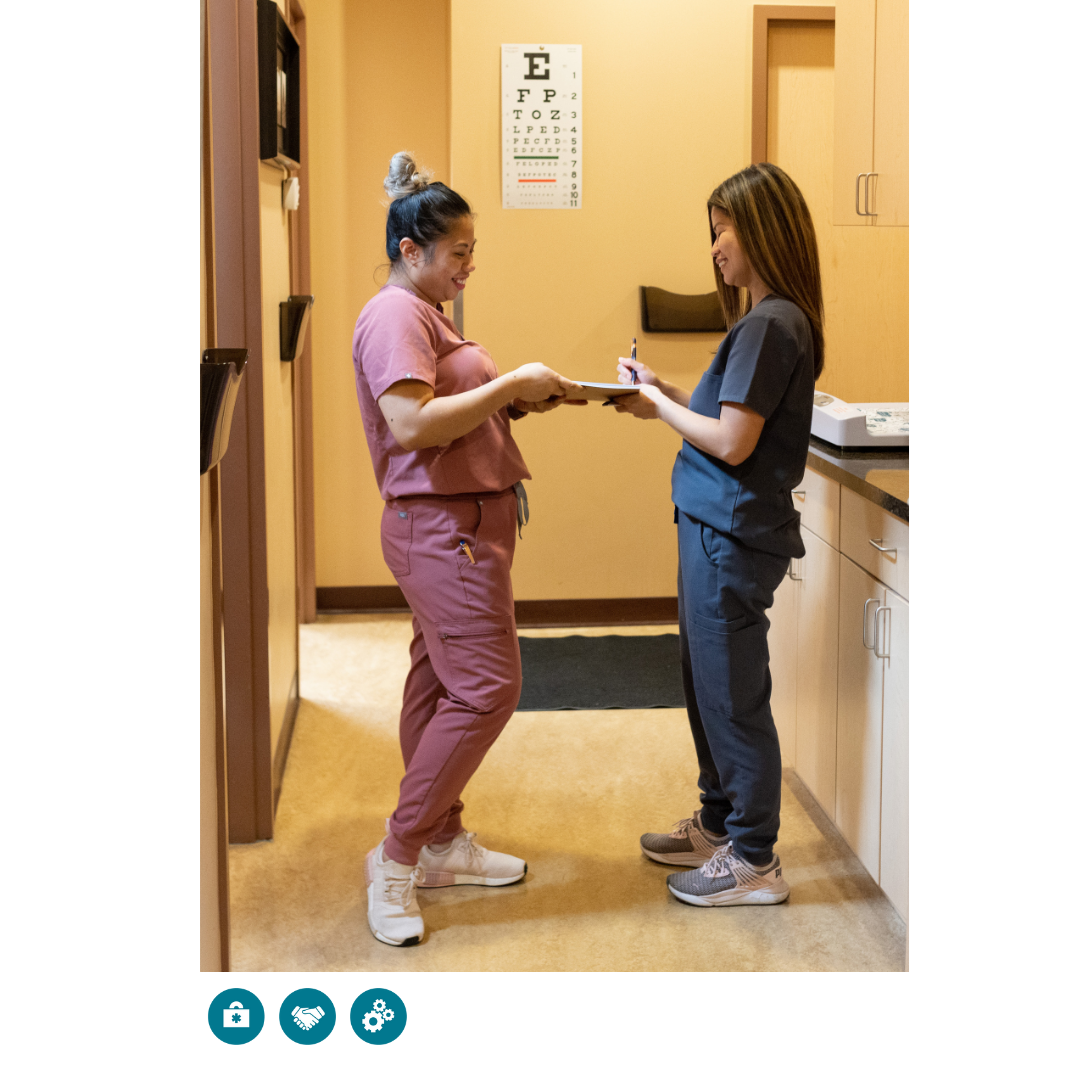ANNUAL REPORT
CPSA in 2023
Through CPSA’s annual report, we publish an overview of our work from the past year, sharing relevant statistics, financials, department summaries and updates. We also take this opportunity to reflect on the year by highlighting key milestones and projects.
Much of CPSA’s work in 2023 involved looking for fresh, innovative solutions to complex issues. Through our annual report, we tell the story of how we’re taking action in the regulation space, so we can make a meaningful impact on health care in our province. Read on to learn more about CPSA in 2023.
Our stories of action towards impact

Department summaries
-
All physicians, physician assistants (PAs) and medical learners must be registered with CPSA before they practise medicine in Alberta. The Registration team reviews all applicants’ education and qualifications, and assesses skills when needed, to ensure their future patients receive high-quality care. Once registered, physicians and PAs must renew their CPSA practice permit annually to confirm any new certifications and practice details. We have the same expectations of all physicians, including locums, physicians with Canadian credentials and those with international training, to ensure they practise safely and competently.
In 2023, international medical graduates (IMGs) made up nearly 35 per cent of Alberta’s physician workforce. Before these physicians could practise in Alberta, they each had to complete a Practice Readiness Assessment (PRA)—the final step to independent practice in Alberta for those who do not have complete Canadian credentials. In January 2023, CPSA launched a five-year pilot project to accelerate the PRA process for IMGs with training comparable to that obtained in Canadian universities. The goal of the pilot is to evaluate whether certain IMGs may begin independently practising within communities faster, while providing safe, high-quality care. By the end of the year, 181 candidates applied for this accelerated route to registration and may be eligible, with 18 beginning their PRA.
-
Part of CPSA’s responsibility as Alberta’s physician regulator is to ensure our regulated members have the skills and knowledge to provide patients in Alberta with high-quality health care. Our team in Continuing Competence works with physicians throughout their careers, supporting their commitment to life-long learning through our quality assurance and improvement programs.
In 2023, Continuing Competence worked with our team in Registration to develop a new competency assessment specifically for international medical graduates who registered to practise in Alberta through a new, accelerated route. Also in 2023, CPSA’s Physician Health Monitoring Program shifted to a program within Continuing Competence, with a focus on health and practice conditions monitoring.
-
CPSA is the only health regulator in Canada with a department dedicated to research, data and innovation. The work of our Analytics, Innovation & Research (AIR) team allows CPSA to make evidence-based decisions and provide regulated members with programs and resources that are meaningful and support quality patient care.
AIR includes the Physician Prescribing Practices (PPP) program, the Tracked Prescription Program (TPP) Alberta and the Research & Evaluation Unit (REVU). PPP provides resources on prescribing and encourages self-reflection to support better prescribing practices. TPP Alberta is a partnership between several Alberta healthcare organizations—administered by CPSA—to monitor the use of prescription drugs prone to misuse and uses TPP Alberta data to educate and improve patient care. REVU conducts health and regulatory-focused research and supports all CPSA departments by evaluating program effectiveness through a variety of research methods.
In 2023, PPP introduced improvements to MD Snapshot-Prescribing, a quarterly online report for physicians with personalized prescribing data. The PPP team also engaged several Alberta physicians in an MD Snapshot Working Group to identify how CPSA can improve this resource and ensure it’s useful to physicians and their prescribing practice.
REVU facilitated several focus groups with physicians and Albertans in 2023. They gathered input and perspectives on antibiotic prescribing, antimicrobial resistance, quality care, and CPSA’s complaints process. REVU presented original research in academic research conferences and public forums across Canada and internationally, published a study on rapid tapering of opioid prescriptions following regulatory intervention, and received the Innovation Award from the Coalition for Physician Enhancement for their work on screening tools to identify physicians who need support improving their practice.
-
Sometimes, the physician is also the patient. When we learn of a physician’s health condition (which can occur when the physician first registers with CPSA, renews their practice permit, self reports or is reported by a colleague), the Physician Health Monitoring Program (PHMP) works with physicians who have health conditions (including physical and mental health challenges, substance use disorders, professionalism concerns and more), providing monitoring and support so physicians can manage their conditions and continue providing care to their patients.
After years of operation as a standalone department at CPSA, PHMP became a program within the Continuing Competence department in 2023 and began transitioning health assessments, fitness-to-practise assessments and biological monitoring functions to external service providers. This change was made to ensure compliance with provincial legislation and aligns with other physician health programs in North America.
-
Most regulated members will receive a complaint at some point during their careers. While this can no doubt be a stressful experience, an important part of profession-led regulation is holding ourselves accountable. As Alberta’s physician regulator, CPSA has a responsibility to ensure regulated members abide by expected standards and provide their patients with ethical, professional care.
Only a small number of complaints result in a hearing and formal disciplinary action. As a learning organization, CPSA takes an educational approach to resolving complaints whenever possible, so physicians can learn from what’s happened and improve their practice for the next patient.
As part of their commitment to ensuring the complaints process is fair, timely and professional, Professional Conduct worked throughout 2023 on the implementation of a new case management system, through which complaints can be submitted online and automatically triaged into CPSA’s systems. The goal is to streamline Professional Conduct’s internal functions and improve the complaints process for both regulated members and complainants.
-
The Hearing Director’s Office (HDO) is responsible for coordinating hearings, complaint review committee meetings, appeals and reviews pursuant to the Health Professions Act. The HDO is also responsible for the recruitment of physician members to Complaint Review Committees and Hearing Tribunals, and supports committee members by organizing opportunities for education and training.
In 2023, Complaint Review Committee and Hearing Tribunal members participated in a number of training sessions on topics such as unconscious bias and online modules related to Bill 21: An Act to Protect Patients. The HDO also initiated an internal review in an effort to modernize processes and improve efficiency.
-
If you’ve been for blood work, an x-ray or have undergone another diagnostic or out-of-hospital surgical procedure, you have likely been in a CPSA-accredited facility. CPSA is responsible for assessing and accrediting these facilities to help ensure they provide safe, high-quality services that meet our standards.
Our Accreditation team works with a number of committees and experts to develop and apply standards that help facilities create quality improvement and assurance systems, to help maintain patient safety. We assess facilities when they first open or any time they renovate, move or add a new service. We then re-evaluate them every four years or sooner if a complaint or concern is raised. New or innovative services offered in non-hospital settings are also often included in the accreditation process.
As an Authorized Radiation Health Registration Agency (ARHA), CPSA also ensures radiation equipment installed or operated within private and public medical facilities is duly inspected and up to standard. As of Dec. 31, 2023, 1,336 pieces of x-ray equipment and 613 pieces of laser equipment were registered with CPSA.
Recently, accreditation for facilities providing community-based psychedelic-assisted psychotherapy (PAPT) has been added to the department’s portfolio. CPSA launched the new PAPT accreditation standards in August 2023, which require relevant facilities to be assessed and accredited by CPSA before they are permitted to provide PAPT services.
Facilities we accredit and support
Cardiac Stress Testing
Diagnostic Imaging
Diagnostic Laboratory Medicine
Hyperbaric Oxygen Therapy
Neurodiagnostics
Non-Hospital Surgical Facilities
Psychedelic-Assisted Psychotherapy
Pulmonary Function Diagnostics
Sleep Medicine Diagnostics
As of Dec. 31, 2023, there are 830 CPSA-accredited facilities in Alberta.
-
Every Albertan deserves high-quality care when they seek medical help. As Alberta’s medical regulator, we are here to ensure patient safety by setting minimum expectations of professional and ethical medical practice in Alberta through CPSA’s Standards of Practice.
CPSA’s Standards of Practice and the Canadian Medical Association’s Code of Ethics and Professionalism (adopted by CPSA) are enforceable under the Health Professions Act and often used in CPSA’s complaints and hearings processes.
We regularly review our standards to ensure they are up to date and comply with provincial and federal laws and regulations. CPSA initiated three consultations in 2023, during which a total of 1,642 participants provided feedback. All eight standards that were consulted on were existing standards.
Existing standards updated
Establishing the Physician-Patient Relationship
Terminating the Physician-Patient Relationship
Responsibility for a Medical Practice
Restricted Activities
Prescribing: Administration
Conscientious Objection
Informed Consent
Medical Assistance in Dying (MAID)
Along with our comprehensive standards of practice, CPSA has Advice to the Profession documents to provide additional context and scenario-based guidance, supporting regulated members in understanding and applying the standards to their practice. In 2023, CPSA updated eight existing Advice to the Profession documents and published two new documents.
Existing advice documents updated
Episodic Care
Physician Assistants
Referral Consultation
Medical Assistance in Dying (MAID)
Closing or Leaving a Medical Practice
Female Genital Cutting/Mutilation
Safe Prescribing
Virtual Care
New advice documents published
Lab Requisitions
Anti-Racism Anti-Discrimination Guidelines
CPSA also develops Advice to Albertans documents to ensure Albertans are aware of their rights and duties as patients. Regulated members are welcome and encouraged to direct patients to these documents for additional guidance. In 2023, CPSA published two new documents.
Advice to Albertans documents published
Female Genital Mutilation
Medical Assistance in Dying (MAID)
All standards of practice and advice documents are available on our website, cpsa.ca.
-
It takes a team to create action towards impact. In addition to the departments that carry out CPSA’s regulatory work, we also have several internal departments that support our entire team. These departments work behind the scenes to keep our organization high functioning, enabling regulatory departments to fulfill our legislated mandate all while simultaneously carrying out their own work in support of CPSA’s mission, vision and strategic directions.
Communications
CPSA’s Communications team works strategically with departments across the organization to create and implement meaningful communications plans, helping them achieve their communications goals. The Communications team also runs CPSA’s website and social media channels, puts together CPSA’s monthly newsletter, The Messenger, and manages larger-scale projects like the annual report you’re reading right now. Communications also supports patient engagement by conducting research and facilitating conversations with Albertans on conversations.cpsa.ca.
Customer Experience
When someone contacts CPSA by phone, email or through our website, they’ll connect with a helpful professional from CPSA’s Customer Experience (CX) team. Our CX team began as a pilot project in 2022 but was so successful it became a permanent fixture soon after, celebrating its first full year of operation in 2023. CX supports our organization by being a centralized hub for information about CPSA, while simultaneously looking for ways to improve our processes, creating a better and more efficient customer experience. In 2023, CX solved up to 98 per cent of inquiries without forwarding them to another department, answering questions and providing assistance in a timely, direct way.
Information Management
Information Management is made up of our Information Technology, Records Management and Privacy teams. This department makes sure our whole team has the right tools and technology to get their jobs done efficiently. They establish and enforce best practices for handling and storing confidential and non-confidential information. Information Management also supports our privacy breach response and handles access requests for sensitive information.
Office of the Registrar
The Office of the Registrar department is made up of CPSA’s Registrar, Deputy Registrar and Chief of Staff as well as the Hearings, Legal Services, Governance and Policy teams. This department contains a mixture of regulatory and operational teams that provide important leadership, guidance and support to CPSA Council and our team. The Office of the Registrar also provides executive leadership for CPSA’s Indigenous Advisory Circle and Anti-Racism Anti-Discrimination Action Advisory Committee.
Operations
CPSA’s Operations department includes our Office Administration, Payroll and Accounting teams. This department keeps CPSA operating smoothly by providing day-to-day office support, establishing efficient workplace processes and overseeing CPSA’s finances to ensure fiduciary responsibility.
People & Culture
Our People & Culture department supports our team with human resources functions. They develop employment policies, manage recruitment and retention, and run our people-focused programs to encourage team members’ continued success and growth. People & Culture leads initiatives that maintain a positive, safe and respectful workplace culture and enhance team member engagement. They also spearhead our team’s Truth & Reconciliation learning activities, among other equity, diversity and inclusion initiatives.
Looking for CPSA’s statistics and financials from 2023?
View the print version of our annual report.























Learn about how CPSA is working to address racism and discrimination in health care.